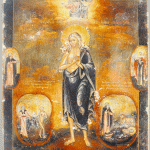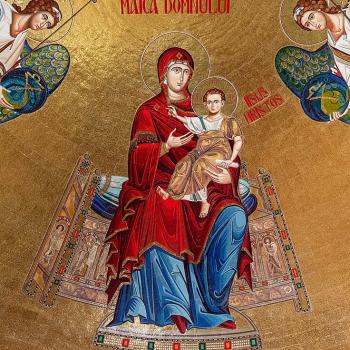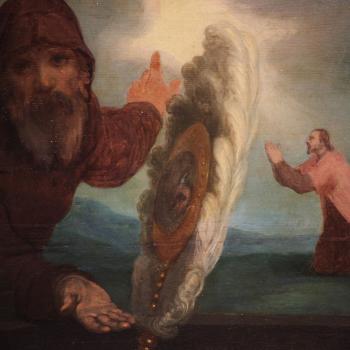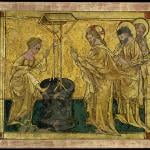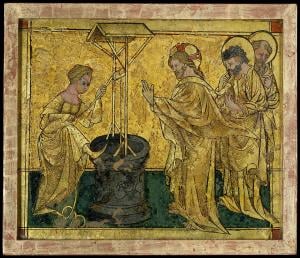
Persecution, though never a good in and of itself, can sometimes inspire the church to change, and change for the better. When it happens, Christians should examine themselves and see if there is something which they have done, something which is not necessary for them to do, that has caused someone to react harshly against them. That is, it could be their attitude, and the way they have treated others which has caused pushback against them. Even if that is not the case, they should do what they can to ease tensions with their neighbors, putting an end to such persecution. Moreover, they should look to what is happening and try to understand what, if any, good they can make of it, which is not to say the situation itself is good, but that it is important to make the best of the situation. We can see this in the Acts of the Apostles when the early Christians, after being persecuted in Jerusalem, found themselves spreading throughout the world, and in doing so, they ended up forming many new local faith communities, communities which would attract many, Jews and Gentile, to the Christian faith:
Now those who were scattered because of the persecution that arose over Stephen traveled as far as Phoenicia and Cyprus and Antioch, speaking the word to none except Jews. But there were some of them, men of Cyprus and Cyrene, who on coming to Antioch spoke to the Greeks also, preaching the Lord Jesus. And the hand of the Lord was with them, and a great number that believed turned to the Lord. News of this came to the ears of the church in Jerusalem, and they sent Barnabas to Antioch. When he came and saw the grace of God, he was glad; and he exhorted them all to remain faithful to the Lord with steadfast purpose; for he was a good man, full of the Holy Spirit and of faith. And a large company was added to the Lord. So Barnabas went to Tarsus to look for Saul; and when he had found him, he brought him to Antioch. For a whole year they met with the church, and taught a large company of people; and in Antioch the disciples were for the first time called Christians (Acts. 11:19-26 RSV).
Christians should not seek martyrdom, and so they should try their best to ease tensions they have with others; they should do what they can to maintain their peace with society at large. The church has specifically stated that if someone desired so much to be a martyr they acted with hostility, and not love, to their neighbor, they cannot be seen as a martyr if they are killed as a result of their bad behavior. Those who look to be persecuted and act in such a way as to make it happen might get it; they will have, as it were, gotten their reward.
Thus, as a result of being persecuted, Christians found themselves being spread throughout the known world They found, in their new communities, many, including Gentiles, drawn to the Christian faith. It might have been a big surprise to them, but it should not have been. Those who had been with Jesus saw the way Gentiles (like a Roman Centurion), and Samaritans, like St. Photina, who Jesus encountered at Jacob’s well, found Christ’s message resonated with them:
There came a woman of Samaria to draw water. Jesus said to her, “Give me a drink.” For his disciples had gone away into the city to buy food. The Samaritan woman said to him, “How is it that you, a Jew, ask a drink of me, a woman of Samaria?” For Jews have no dealings with Samaritans. Jesus answered her, “If you knew the gift of God, and who it is that is saying to you, `Give me a drink,’ you would have asked him, and he would have given you living water.” The woman said to him, “Sir, you have nothing to draw with, and the well is deep; where do you get that living water? Are you greater than our father Jacob, who gave us the well, and drank from it himself, and his sons, and his cattle?” Jesus said to her, “Every one who drinks of this water will thirst again, but whoever drinks of the water that I shall give him will never thirst; the water that I shall give him will become in him a spring of water welling up to eternal life” (Jn. 5:7-14 RSV).
Much can be said about the way Jesus addressed a Samaritan woman, breaking through two social barriers, the first being the barrier between the Jews and the Samaritans, and the second being the barrier between the genders. In the incarnation, Jesus came to bring humanity together, to overcome the division caused by sin, division which is seen in the way humans treat “the other,” be it those of other cultures, or those of other genders. Thus, when Jesus encountered the Samaritan women, he was able to tell her she would be welcome to that which he had to offer, that is, the water the life, the fount of the Holy Spirit, if she wanted it and asked him for it. At first, she was confused and did not understand what Jesus had said; did he not first ask her for water? Why, then, did he say if she asked him, he would give her living water instead? She was intrigued, and continued to converse with him, whereupon he revealed his care and concern for her, showing, moreover that he knew her, indeed, he knew her more than she knew herself. She came to believe him to be the messiah, the expectation of all the nations, and she became his disciple. St. Photina’s first act of faith was to preach about Jesus, telling them about what had happened and why she believed him to be the messiah.
Jesus consistently elevated the status of women in his ministry, often to the surprise of his disciples, just as he said that the kingdom of God could be and would be shared with more than those who are self-righteous (Jews and Gentiles alike). St. Photina was welcomed by Jesus despite the kind of life she had lived, indeed, she was welcomed by Jesus after Jesus made it clear he knew who she was and what her life had been like; by being so welcoming, she responded in kind, and opened herself up to him and became his follower (one who would spread the Gospel and eventually become a martyr in the time of Nero). Jesus showed it is not the self-righteous, those who think they are better than others, who will be the first in the kingdom of God, but those who humbly acknowledge they are not righteous and have the need for the water of life, of the Holy Spirit and the gifts of the Holy Spirit, in their lives.
Thus, the Byzantine Lectionary, in giving us these two readings for the Sunday of the Samaritan Woman, presents to us the way Christ offers us all the living waters, the Holy Spirit, who comes to us thanks to the way Jesus completed his temporal ministry with his resurrection from the dead (and his ascension into heaven). The Holy Spirit is freely given to those who ask, but they have to ask in proper humility, recognizing their need for the Spirit: the self-righteous are far from the truth, far from understanding their need of grace, and so will prove to be far from leading a good and holy life. The self-righteous are not ready for the Spirit, as they are so focused on themselves and the glory they think they already have. Only those who are not self-absorbed will find they are ready for the Holy Spirit, and the Spirit’s guiding influence on their lives.
Stay in touch! Like A Little Bit of Nothing on Facebook.
If you liked what you read, please consider sharing it with your friends and family!
N.B.: While I read comments to moderate them, I rarely respond to them. If I don’t respond to your comment directly, don’t assume I am unthankful for it. I appreciate it. But I want readers to feel free to ask questions, and hopefully, dialogue with each other. I have shared what I wanted to say, though some responses will get a brief reply by me, or, if I find it interesting and something I can engage fully, as the foundation for another post. I have had many posts inspired or improved upon thanks to my readers.








